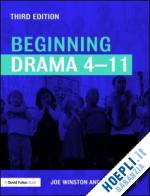Preface to the Third Edition Introduction Drama is playful Dramas use stories to explore issues of human significance In drama, the normal rules of time, place and identity are suspended Drama is a social activity and a communal art form Drama is driven by rules and conventions Dramas should not be boring 1. Beginning drama with games Games and how they relate to drama Games which involve movement in space Games for pairs and small groups Circle games Games which suggest stories Some strategies to help with organisation and control 2. Beginning drama with a story: The Forest Child ‘Keeper of the Keys’ (Year 1 upwards) Previewing the story (Reception upwards) Presenting the story (Reception upwards) Acting out the story (Year 1 upwards) Making a map of the story (Year 2 upwards) Creating the forest through sound (Year 3 upwards) Creating the forest through movement (Year 4 upwards) Showing the worst moment for the Forest Child (Year 2 upwards) Questioning the Hunter (Year 2 upwards) A meeting of the animals of the forest (Year 2 upwards) Revisiting the sounds of the forest (Year 3 upwards) How might this new story end? (Year 4 upwards) Planning a drama lesson: some basic considerations 3. Beginning drama in the early years Planning for imaginative play The drama lesson in the early years 4. Drama in the curriculum Example 1 - The 3 Pigs' Homes Points to consider Example 2 - The Terracotta Army Points to consider Example 3 - The Saxons and the Viking Raids Points to consider Example 4 - Building the Reservoir Points to consider Example 5 - The Siege of Troy Points to consider A framework for planning to teach drama Learning area Key questions Intended learning outcomes Starting point Outline of activity Further questions / activity Managing the pace and direction of the drama Moving the thinking on: teacher questioning in the drama lesson 5. Drama and literacy Example 1 – The Three Billy Goats Gruff (Reception / Y1) Example 2 – Giggle, Giggle, Quack (Year 2/3) Example 3 – Arthur (Year 4) Example 4 – Quetta (Year 5) Example 5 – Romeo and Juliet (Year 6) 6. Drama, community and performance in the primary school Example 1: The Enchanter’s Daughter (Year 6) Example 2: The Snow Queen (Year 2) Some guidelines for those new to running school drama productions 7. Progression, continuity and assessment in primary drama First principles of progression Progression and continuity in drama within the personal, social and moral curriculum Making, performing and responding Learning objectives specific to drama Policy and practice Publications referred to in this chapter Appendix 1 The Forest Child Appendix 2 A selection of drama conventions Bibliography Index











